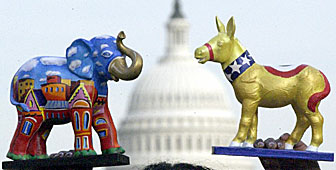
Swiss add some colour to Washington politics

Swiss artists are taking part in a project to fill Washington DC's streets with painted elephants and donkeys.
Almost 200 sculptures of the animals – long-standing symbols of the United States’ Republican and Democratic parties – have been painted by dozens of artists, from professionals to school children.
The brainchild of Washington DC mayor Anthony Williams, the “Party Animals” project aims to use the decorated animals – which are about 1.5 metres in size – to bring some levity to the capital after the grimness of last year’s terror attacks
While American schools, foundations and artists are taking part; Switzerland has also got a presence.
Zurich-based artist Jan Leiser, and Annina Luck, a worker with the culture division of Switzerland’s US embassy, have just put the finishing touches on their animals.
Democratic donkey
Leiser has chosen to cover his Democratic donkey with typically Swiss images of a young goat-herder, cheese and cows.
“Folklore always works with the Americans,” Leiser said.
Meanwhile his compatriot, Luck, has chosen the Republican elephant, rendering its trunk as an alphorn alongside a schnapps-barrel around its neck – St Bernhard style.
The donkey and elephant symbolism started in the 1870s when cartoonist Thomas Nast used the animals to poke fun at politicians. Since then, they have become well established and accepted features of American political imagery.
But the exhibition, which runs until the northern hemisphere’s autumn, has drawn fire from other parties.
The Greens have complained that the exhibition focuses only on Democrats and Republicans, and ignores smaller parties. Their complaint? “Whether donkey or elephant, politics in Washington is always the same”. A zoo?
swissinfo with agencies

In compliance with the JTI standards
More: SWI swissinfo.ch certified by the Journalism Trust Initiative



























You can find an overview of ongoing debates with our journalists here . Please join us!
If you want to start a conversation about a topic raised in this article or want to report factual errors, email us at english@swissinfo.ch.